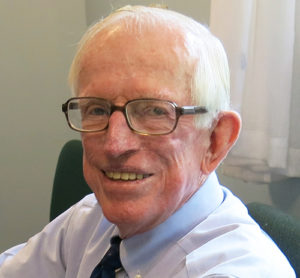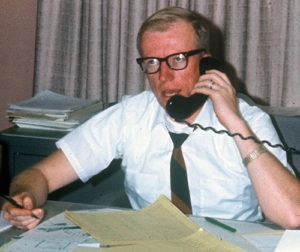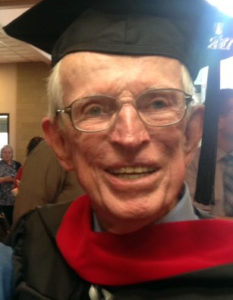A Life of Transformational Love: Lapp’s New Book Explores the Intersection of Faith and Social Activism

Some pundits call the current times “post-Christian.” Others have named it a time to re-discover “real” Christianity. In his new book, Listening for the Holy — A Life Journey, long-time justice activist, serving leader, and UCC minister the Rev. Robinson G. Lapp seeks to reawaken the divine spark in each of us.
“In an era in which faith communities are in decline, we are learning that ‘church work’ is much more in the public square than in safe sanctuaries,” says Lapp about the book. “Loving others is more important than reciting ritual and dogma among friends.”
The book chronicles the evolution of Lapp’s faith journey from childhood to the present. With astonishing honesty and self-evaluation, Lapp skillfully weaves stories about his life and family with the ways in which the those experiences changed and broadened both his perspective and his life’s work.
Raised a Methodist, Lapp had a transformative camp worship experience that set him on a career in ministry. After enrolling at UCC-related Chicago Theological Seminary (CTS), he started discerning his own call, which would begin with parish and youth ministry and lead to his lifetime of ministry “outside the doors” — as he calls it — in order to confront white privilege, systemic racism, and economic injustices.
“What Christianity was becoming for me,” he writes about his CTS experience, “is the compelling story of how God brought into this world a revolutionary who started his ministry by inviting twelve ordinary men to help him show God’s love for everybody, both in individual encounters and in his transforming narcissistic-driven cultures. Jesus was a radical, born in poverty, who modeled sacrificial living on behalf of the broken and dispossessed.”
Lapp’s journey has included serving new church starts; helping create the New Town of The Woodlands in Texas; and serving on the boards of several faith-based nonprofits, Chicago Theological Seminary, and UCC denominational entities. He also co-founded Archway Housing and Services, Inc., a CHHSM member nonprofit based in Lakewood, Colo., that builds low-income housing and provides social assistance for people who have traditionally been marginalized in society.

The book chronicles various experiences, including Lapp’s participation in the 1963 March on Washington and being shot at while in Selma in 1965. His “radical” insistence on “making life work for everyone” has led to his being fired twice, but also has shaped his life and work.
One of the most revealing passages in the book concerns what Lapp learned from being fired from the Metro Denver Fair Housing Center — of which he was the organizing executive director — in the early 1970s, the result of dismissing an African-American employee for having a loaded Uzi in his office. When the man wouldn’t remove the gun from the offices, Lapp fired him. The resulting protest from prominent African-American rights organizations led to Lapp being let go. In reflecting, he writes, “Looking back, I did not yet quite understand the deep meaning of white privilege in our systemically racist society.”
Lapp continues, “I was blinded by my philosophical commitment to the truth that all people are equal. I did not see that the negative educational, economic and cultural African American experience in America, and in Denver, put African Americans at a fundamental disadvantage, and thus not able to complete with whites. … In my commitment to peaceful solutions to societally unjust realities, I saw [what had occurred] as both illegal and immoral. I simply did not recognize that societally things were so bad for Black Americans they felt a legitimate need to take to the streets, even with guns.”
Such honesty in reflection is what makes Listening for the Holy such a treat to read and contemplate. Lapp weaves such stories in with his own struggles to redefine his faith and beliefs in terms of a broader, more inclusive way; to reach a point where all life, he writes, is “a spiritual journey, walked as a joint venture with the Holy that infuses all of life with hope.”
The genesis of the book’s premise came for Lapp while earning a master’s degree in Sacred Theology in 2017 at CTS. As someone already in his 80s, Lapp became the oldest graduate in the seminary’s history. But even then, he found new ways to define and shape his life’s work.

“During my first CTS degree journey, I gained a Christian vocabulary for the human experiencing of God’s justice and mercy,” he writes. “Sixty years later, in taking ‘New Social Gospel,’ from Professor Susan Thistlethwaite, I realized what a gift I was receiving in doing formal study, analysis, and reflection toward the end of a career as a non-traditional minister.”
Lapp says he hopes that readers will make several discoveries within the pages of his book. One, directly from his experiences during his ST/M degree studies, is that “the pre-Easter Jesus is a key paradigm model for faithfulness to the Holy.”
“For Christians,” he writes, “to be willing to pay the ultimate price on behalf of the whole human community is the essence of understanding, and committing to, the meaning of the life of the ‘man from Nazareth.’ As Jesus found out, doing what is right is counter-cultural, even unto death.”
Lapp says that one major tenet in his book that he hopes people will take away from it is that “there is an unseen, life-creating force that calls all people to engage in making life work for everyone, regardless of the cost, the dong of which gives one courage and spiritual strength.”
Or, as he writes in his book, “I think God is the transcendent Holy that calls all of humanity to care for, and to love, others more than self. There is, in the fabric of human existence, a pull toward making life work for everyone, despite the human propensity to do just the opposite. That pull is a transcendent holy call. Responding to it is what strengthens one’s soul and saves one’s life.”
Find “Listening for the Holy — A life Journey” at amazon.
Join Our Mailing LIst
Follow on Facebook
Iredell Adult Day Services Hosts Ribbon-Cutting to Celebrate Adult Day Health Certification - CHHSM
www.chhsm.org
Iredell Adult Day Services (IADS) in Newton, N.C. — a nonprofit organization dedicated to caring for older adults, vulnerable groups, and their families, and part of EveryAge — hosted a ribbon cut...